

What makes muscles grow? - Jeffrey Siegel. Teens – Dietitians Association of Australia. Good nutrition is critical during teenage years to support healthy growth and development.
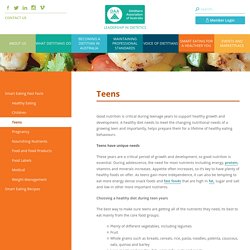
A healthy diet needs to meet the changing nutritional needs of a growing teen and importantly, helps prepare them for a lifetime of healthy eating behaviours. Teens have unique needs These years are a critical period of growth and development, so good nutrition is essential. During adolescence, the need for most nutrients including energy, protein, vitamins and minerals increases. Appetite often increases, so it’s key to have plenty of healthy foods on offer. Choosing a healthy diet during teen years The best way to make sure teens are getting all of the nutrients they need, its best to eat mainly from the core food groups: Nutrition Australia. Nutrition for the Adolescent Athlete.
About Adolescent Health Ask any parent of a teenager and they probably have a colourful story of just what happens to the fridge when their sons and daughters arrive home from a hard day at school. Perhaps they have been asked to pack more into the lunchbox, or they notice the sly bowl of cereal consumed after dinner. Add to that the considerable load that many adolescents are put under in organised sport, and you can see that it can be quite a job to fuel a teenager, let alone a teenage athlete. While the Australian dietary guidelines provide suitable advice for adolescents who participate in general physical activity, special issues of sports nutrition begin to emerge for those who have a high-level of participation in sport.
The adolescent athlete is in a unique situation. This fact sheet is targeted at athletes aged 12-18 years who have involvement with organised training and competition (active adolescents) and those with higher training volumes (competitive adolescents). Iron. Proteins. YouTube. Weight and muscle gain. Reasons for lack of weight gain A person’s build depends largely on genetic factors, which is why it is difficult for a naturally thin person to put on weight.
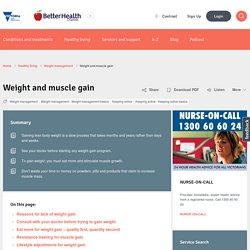
The human body can change to a limited extent through weight training and increased food intake. Gaining or regaining weight can be just as difficult as losing weight. When done in a smart, healthful way, many of the same basic principles apply to both gaining and losing weight. How to calculate Lean Body Mass (LBM) Nutrition and healthy food for teenagers. Why older children and teenagers need healthy food and good nutrition Teenagers go through big physical changes in puberty.

They need extra nutrition to fuel these physical changes, which means they need to eat healthy food. Your child’s level of physical activity and stage of development determine exactly how much healthy food she needs. But you’ll notice she has a bigger appetite, which is her body’s way of telling her to eat more. Protein powder supplements.
Nutrient needs in adults change with age, and it's increasingly recognised that elderly – and also possibly middle-aged – people need more protein than younger adults.
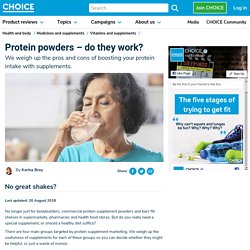
Because of changes in your metabolism, you need a larger 'dose' of protein to stimulate the muscle building process. Inadequate protein is linked with loss of bone mass (osteopenia and osteoporosis) and muscle wastage (sarcopenia), and also affects immunity and wound healing. How much do middle-aged and older adults need? The Nutrient Reference Values for Australia and New Zealand recommend 0.75 g/kg for adult women and 0.84 g/kg for adult men. At 70, however, this increases to around 1 gram (1.07 grams per kilogram for men and 0.94g per kilogram for women). Building muscle is more than just chicken & broc! – Youfoodz. How Do You Measure Muscle Gain? - BuiltLean.
Do you know how to measure how much muscle you are gaining or how much fat you are losing?
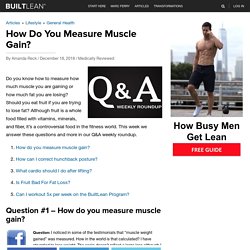
Should you eat fruit if you are trying to lose fat? Although fruit is a whole food filled with vitamins, minerals, and fiber, it’s a controversial food in the fitness world. This week we answer these questions and more in our Q&A weekly roundup. Protein Supplementation. There is probably no other nutrient that gets as much attention with sports people more as protein owing to its role in muscle growth and repair.
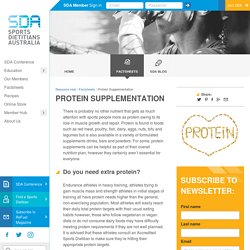
Protein is found in foods such as red meat, poultry, fish, dairy, eggs, nuts, tofu and legumes but is also available in a variety of formulated supplements drinks, bars and powders. For some, protein supplements can be helpful as part of their overall nutrition plan, however they certainly aren’t essential for everyone. Do you need extra protein? Endurance athletes in heavy training, athletes trying to gain muscle mass and strength athletes in initial stages of training all have protein needs higher than the general, non-exercising population.
Most athletes will easily reach their daily total protein targets with their usual eating habits however, those who follow vegetarian or vegan diets or do not consume dairy foods may have difficulty meeting protein requirements if they are not well planned. Most Commonly Asked Questions About Protein. Why can’t I get my protein from foods I eat?

Do I need to take a protein powder? These are two of the most commonly asked questions which can easily be answered, and no you don’t need to have a nutritional degree to understand the basics. Here is how it all works. Most Commonly Asked Questions About Protein. Amino Acids vs. Protein Powder – Sports Medicine Weekly. 2018 csiro protein balance report. How much protein you should eat according to your age. The body is made up of more than 600 muscles, each with a specific job.
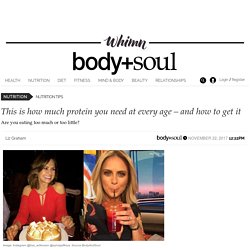
There are the involuntary muscles that perform essential functions such as swallowing and passing urine, then there are the skeletal muscles that help us move, the ones we can make bigger and stronger. We do this with exercise and diet, and that’s where protein comes in – it feeds muscle, repairs and maintains it.
However, while the amount you eat is important, it’s not the whole story. Nutrient Reference Values. Unlike the micronutrients, the macronutrients (proteins, fats and carbohydrates) all contribute to dietary energy intake.
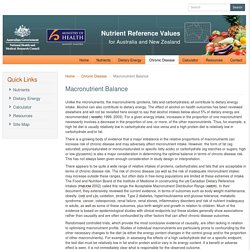
Alcohol can also contribute to dietary energy. The effect of alcohol on health outcomes has been reviewed elsewhere and will not be revisited here except to say that alcohol intakes below about 5% of dietary energy are recommended ( NHMRC 1999, 2003). For a given energy intake, increases in the proportion of one macronutrient necessarily involves a decrease in the proportion of one, or more, of the other macronutrients. Thus, for example, a high fat diet is usually relatively low in carbohydrate and vice versa and a high protein diet is relatively low in carbohydrate and/or fat. There is a growing body of evidence that a major imbalance in the relative proportions of macronutrients can increase risk of chronic disease and may adversely affect micronutrient intake. Dietary modelling involved two approaches.
What Happens If You Eat Too Much Protein? You’re probably familiar with high-protein diets, which have seen a recent resurgence since diets like Atkins and the Zone gained popularity in the 1990s.
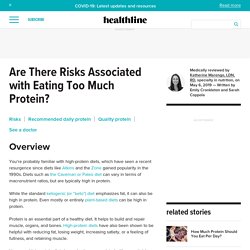
Diets such as the Caveman or Paleo diet can vary in terms of macronutrient ratios, but are typically high in protein. While the standard ketogenic (or “keto”) diet emphasizes fat, it can also be high in protein. Even mostly or entirely plant-based diets can be high in protein. Dangerous Signs You're Eating Too Much Protein & How To Fix It. With the recent rise of low-carb regimes, over the last few years, the prevailing wisdom has become: the more protein the better. And as crucial as this amino acid building block is, if you eat too much of it you could end up with bad breath, weight gain, constipation, diarrhea, dehydration, calcium loss, kidney damage and even heart disease.
Suffice to say, eating the right amount of protein is essential for both your short and long-term health. The hidden dangers of protein powders. Image: © jirkaejc/Getty Images Adding protein powder to a glass of milk or a smoothie may seem like a simple way to boost your health. After, all, protein is essential for building and maintaining muscle, bone strength, and numerous body functions. And many older adults don't consume enough protein because of a reduced appetite. But be careful: a scoop of chocolate or vanilla protein powder can harbor health risks. "I don't recommend using protein powders except in a few instances, and only with supervision," says registered dietitian Kathy McManus, director of the Department of Nutrition at Harvard-affiliated Brigham and Women's Hospital.
Macronutrients. Nutrients are substances needed for growth, energy provision and other body functions. Macronutrients are those nutrients required in large amounts that provide the energy needed to maintain body functions and carry out the activities of daily life. There are 3 macronutrients – carbohydrates, proteins and fats. Macronutrients give us energy Although each of these macronutrients supplies the energy needed to run body functions, the amount of energy that each provides varies. Carbohydrates and proteins each provide 17kJ/g whereas fats provide 37kJ/g. 1 kilojoule (kJ) = 1000 joules. Does Protein Make You Put on Unwanted Weight? When it comes to diet and weight loss, compared to carbs and fat, protein seems to be on the winning side.
However, protein is a source of calories, and eating an excessive amount of calories from protein, or any other macronutrient, can lead to unwanted weight gain. If you're concerned about your weight, consult your doctor to help you design a diet plan that fits your needs. If you're trying to prevent weight gain, you want to include in your diet lean sources of protein, like seafood. Image Credit: AlexPro9500/iStock/Getty Images Video of the Day. 3 benefits of eating a high protein diet.
Protein. Proteins are made of amino acids. What Is Protein? How do you know if you are eating too much protein? Proteins are the most versatile molecules for the human body and are key to almost all biological processes. The Heart Foundation. Which Is Better to Build Muscle Mass: Carbs or Protein? Macros For Building Muscle - Transparent Labs. Proteins Are Degraded to Amino Acids - Biochemistry - NCBI Bookshelf. Hyperbaric Oxygen Therapy Centre. Many athletes and sports enthusiasts experience muscle injuries at some point in their lives.
Park Avenue Chiropractic - What are Adhesions? Is Nutrition More Important Than Exercise? Effect of testosterone on muscle mass and muscle protein synthesis. - PubMed - NCBI. Protein Powder: Everything You Need To Know. If you’re putting in the hours in your gym’s weights room, lifting dumbbell after barbell after kettlebell, it’s only natural to expect bigger, stronger muscles. Unfortunately, if you’re not also making the same effort in the kitchen to ensure you’re eating the right food to support your workout regime, the effect of your exercise might be a little disappointing. How Microtears Help You to Build Muscle Mass. It seems counterintuitive to purposely injure yourself during a workout, but that, in essence, is what you must do to build muscle mass. That doesn’t mean you should reach for the heaviest barbell at the gym and attempt 100 repetitions daily, orthopedic surgeon Michael Karns, MD says.
The Meaning of Muscle Hypertrophy and How It Happens. Why Extra Protein for Your Child Is Unnecessary – and Possibly Dangerous. Protein Supplement Myth Revealed by Body of Work. Building a Great Physique is 80% Diet and 20% Exercise? (The Real Truth) How Much Protein Do You Need When Lifting Weights? Health Check: here's what you need to know about protein supplements. Is It Any Different Than For Men?!
Protein. Pumped on protein: can a shake ever be as good as a plate of food? CrossFit. Silver Star – Grains and Starchy Vegetables. The Meaning of Muscle Hypertrophy and How It Happens. MolymodBrief. Contact Us. Specialist Dietitian. Interview. Helen Kollias, PhD, Author at Precision Nutrition. Woodville – Snap Fitness Australia.